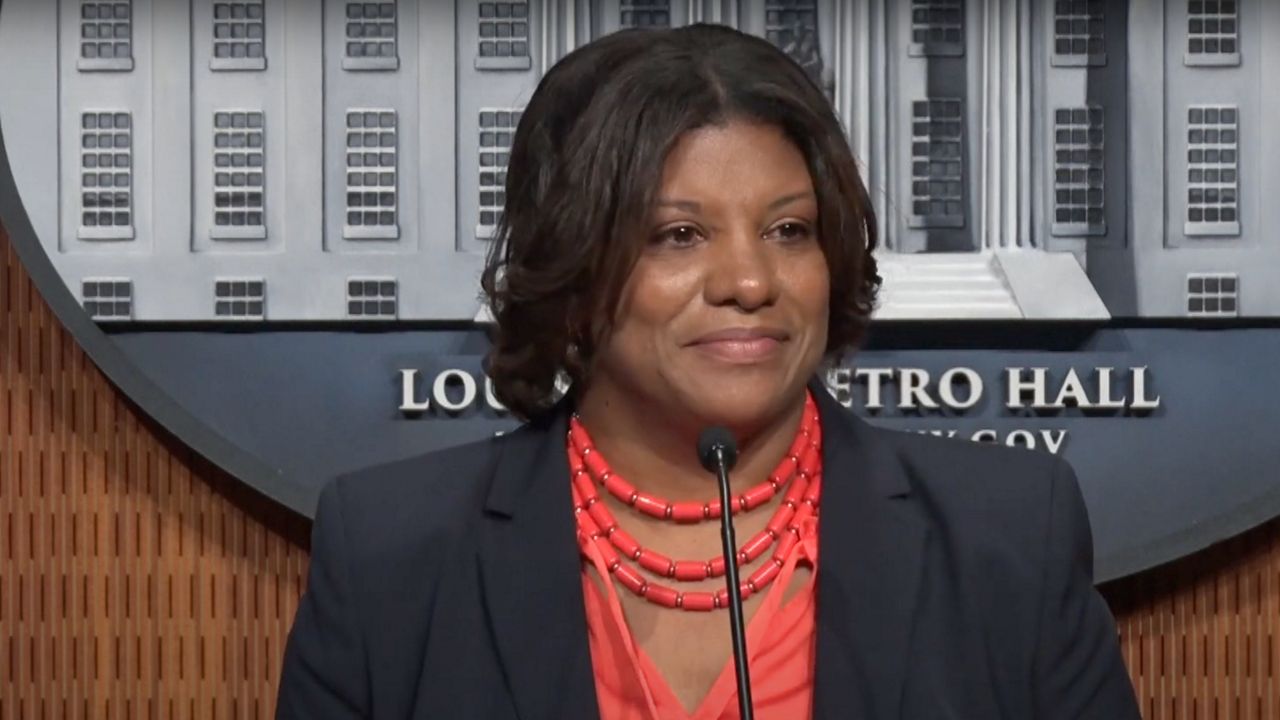LOUISVILLE, Ky. — When Yvette Gentry takes over the Louisville Metro Police Department on October 1, she will make history. A former deputy chief who retired in 2014, Gentry will be the first woman to lead the department when she become interim police chief. That matters, she said in a press conference Monday.
“It should feel historical — first woman,” she said. “This is going to signal some change. A new day’s coming.”
Gentry, who stands to inherit the interim chief role from Robert Schroeder, who took over for Steve Conrad just three months ago, hinted at what that new day could look like. She referenced issues of inequity in Louisville’s West End, acknowledged the challenges of systemic and individual racism, and briefly became emotional.
“This is a fresh approach,” Mayor Greg Fischer said Monday. “A unique approach, with a woman that has a lot of experience and can bring so many different people to the party.”
Fischer’s comments reflect years of research showing that women police officers approach the job differently than men. There’s also little doubt that women police chiefs lead differently, said Kym Craven, executive director of the National Association of Women Law Enforcement Executives.
“The collaborative nature for women, the problem solving, and looking at things through a different lens — it’s just a different style than many men lead with,” she said.
Women, Craven says, excel at relationship building, which can be helpful both in the community and within the police force.
“If you sit in a discussion with women, men will quickly come to a final decision,” she said. “There’s a tendency for women to look at it from different viewpoints and strategize, and think about everybody’s input. Some view that as more inclusive.”
On the force, women police officers have been shown to inspire more trust than men. They’re better communicators and less likely to use excessive force. A 2017 Pew survey of nearly 8,000 police officers found that only 11 percent of female officers reported ever firing their weapon, compared to 30 percent of male officers. Female officers also expressed more confidence in their ability to handle situations without using aggression.
Despite these advantages to having more women in policing, they remain a small minority, representing only 13 percent of police forces around the country and nearly 15 percent of the force in Louisville. The number of women in police leadership is even smaller — only three percent, according to a 2016 survey from the Justice Department.
The first female police chief in the U.S. wasn’t hired until 1985, when Penny Harrington took over the Portland Police Bureau. Among her first moves was an attempt to reform the department’s use of force policy. She was out of the job the next year. This year has seen highs and lows for female police chiefs. In Philadelphia, Danielle Outlaw took over the fourth largest police force in the country, while in Seattle, Carmen Best resigned her post amid budget cuts and political unrest.
Gentry will take over as Louisville’s top cop with her city experiencing its own upheaval. It’s been six months since the police killing of Breonna Taylor and demonstrators are still in the streets demanding justice for the 26-year-old. The city, like many others, is also seeing a surge in gun violence.
Gentry did not promise to solve the city’s problems during her time as police chief, which will not last more than six months. But she did pledge honesty. “When we’re wrong, I’m going to stand here like a woman, a grown woman, and tell you we made mistakes,” she said. "And when we’re right, and I believe we’re right, I’m going to stand here and say we’re right, even when it’s not popular.”



